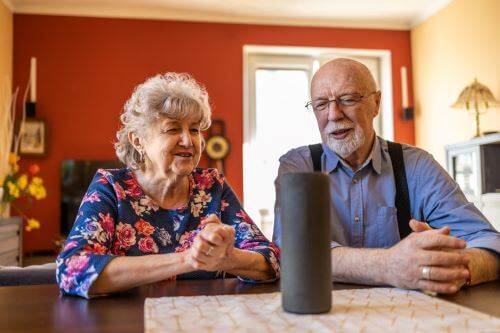
AI in Senior Living Communities: Aging in Modern Times
These days, it’s hard to escape the presence of artificial intelligence (AI). After chatGPT and other natural language processing (NLP) tools exploded in popularity in early 2023, every aspect of our lives now seems to involve an AI question. Elder care is no different. But where many AI conversations are touched with uncertainty, AI for seniors is an overwhelmingly positive and exciting topic.
Let’s take a look at how AI is paving the way for brighter futures as we learn what it looks like to age in modern times.
5 Ways Artificial Intelligence Will Transform Senior Living for the Better
Wearable Technology Allows for Earlier Health Interventions

The extent of wearable technology used to be a pendant worn around the neck, which can be pushed to call a caregiver in case of an emergency. While there are still applications for these devices, smartwatches are rapidly going above and beyond what analog call buttons have done.
Popular consumer technology options like Apple Watch and Fitbit offer stylish yet effective health management tools for seniors. AI grants these devices excellent health-tracking abilities that senior care communities can use to monitor and manage chronic conditions, learning baselines and examining patterns over time.
When vital signs change—often before visible symptoms arise—caregivers can take actionable steps earlier, improving long-term outcomes.
AI Tools Offer Caregivers a Helping Hand in Fall Detection & Prevention
About 36 million older adults fall each year, according to the CDC, accounting for millions of ER visits. When these falls are not responded to quickly or properly, serious injury and even death can result. Many smartwatches, including the Apple Watch 5, now come with built-in fall detection mechanisms. Long-term care (LTC) facilities are also incorporating their own robust, non-intrusive sensor technologies to detect and prevent falls.
We’re already seeing real-time fall detection sensors helping care communities respond to incidents faster. Administrators can even review data to learn what caused a fall and make informed changes to their facility’s safety and design.
As machine learning improves, we may eventually see high-tech systems designed to monitor changes in balance and gait, which could determine if a person is likely to fall. This could prompt caregivers to intervene proactively, preventing injuries before they ever happen.

Voice Assistants Help Seniors Find Their Voice
Believe it or not, adults 65 and older are one of the fastest-growing segments of voice-assisted technology users. From voice reminders programmed into pill dispensers to personalized calendar integration, AI technology is making it easier than ever to stay connected to the larger world.
Using voice commands, seniors can do more than simply get medication reminders. For example, they can:
- Ask the assistant to call their family members for a video chat
- Play their favorite music or get new recommendations
- Find nearby local activities to enjoy
- Get news updates tailored to their preferences and interests
- Get step-by-step instructions for activities they want to learn
- Much more!
Smart Devices Keep Family Members Engaged & Connected
Peace of mind is a major component of choosing the right senior living option for your family member. Thankfully, AI care services will make it easier than ever for you to stay connected with your loved one. This is especially important for families who don’t live close enough to the community to visit on a frequent basis.
AI-powered systems can send relevant updates right to your phone and allow you to communicate directly with care teams, even at a distance.
Robust Data Systems Improve Care Quality Across the Board
One of the most promising aspects of AI in assisted living and independent living communities is the way it will improve the efficiency of care. AI can’t and won’t replace human interaction. Instead, it will empower caregivers with stronger tools, allowing them to focus on creating more valuable touchpoints with the residents in their care.
More health information and incident reporting processes are moving from paper logs to systems with machine learning powers. With this change, administrators will gain crucial insight into care improvements based on real-time facts and patterns. Staff will also benefit from using AI to:
- File paperwork
- Dictate notes with voice recognition technology
- Gather and review health data automatically
- Streamline patient & family member communications
Ultimately, these improvements in efficiency will give staff more time to focus on the person in their care. This is expected to decrease burnout, improve retention, and holistically strengthen the quality of care older people receive.
CarePatrol Helps Families Find Bright Futures
At CarePatrol, our senior care advisors are excited about the possibilities that AI brings to senior care solutions. For over 30 years, we’ve been dedicated to helping families and their loved ones find the senior living option that meets their needs.
We’re already seeing the impact that these technologies can make on residents’ well-being. And because we only recommend communities that we have vetted and can provide the level of care required for your individual needs, our teams are ready to help you find the perfect senior care solution for your loved one.
If you’re seeking care for yourself or a loved one, learn more about our services and how we can help your family today!
CarePatrol: Explore Pre-Screened Senior Living Communities in Your Area
CarePatrol is a national network of local senior care experts serving communities across the U.S. Our senior care advisors have vetted thousands of assisted living, independent living, and memory care facilities, and they offer highly personalized recommendations and resources at no cost to you. If you’re seeking senior care solutions, contact your local CarePatrol today for free assistance!